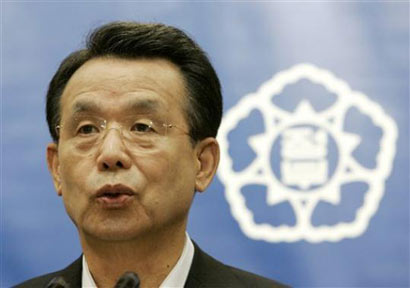You are hereBlogs / WcP.Observer's blog / "Matter of survival": 5th-largest oil consumer South Korea restricts energy use to avert full-fledged crisis due to fuel prices
"Matter of survival": 5th-largest oil consumer South Korea restricts energy use to avert full-fledged crisis due to fuel prices

(quote)
SEOUL (Reuters) - South Korea said on Sunday it was implementing a multi-stage contingency plan aimed at reducing energy consumption before the skyrocketing oil prices push Asia's fourth-largest economy into a full-fledged crisis.
Prime Minister Han Seung-soo told a televised news conference the government would restrict driving of cars owned by public organizations as part of the measures, adding a tougher set of steps would be adopted if oil prices rose further. The move marks the first direct restriction on energy consumption introduced by the world's fifth-largest oil consumer since the country imposed some restrictions on transportation in the capital during the 1988 summer Olympics held in Seoul.

Thousands of public-sector vehicles will be allowed on the road only on alternate days, and air conditioning in government buildings will be restricted, according to Prime Minister Han Seung-soo. The restrictions will be introduced July 15 and will apply to 15,000 public-sector vehicles and more than 800 public offices and institutions. There are also plans to replace half the fleet of public-sector vehicles with compact or hybrid versions by 2012.
"Even the (oil) producing countries are now trying to save energy costs. We need to try twice as hard as they do... it's a matter of survival," Han said. South Korea covers almost all of its energy needs with imports and its economy, relying heavily on manufacturing of goods for exports, lags far behind the more advanced countries in energy efficiency.

"We expect to spend $111.2 billion this year on crude oil imports, up from $60.3 billion last year, due to prices that have more than doubled," Han said. The Finance Ministry cut last week this year's economic growth target to a three-year low of 4.7 percent from 6 percent and warned the country would post its first current account deficit in 11 years of about $10 billion due to high oil prices.
Finance Minister Kang Man-soo told the news conference the country's economic forecasts, based on the assumption of prices at $120 a barrel on average for the second half, would have to be revised further if crude oil continues to gain.
The measures -- restricting driving, raising average temperatures at government-owned buildings, and regulating use of power at public facilities -- would help reduce energy consumption by the public sector by 6.6 percent. But they are still largely symbolic and the total amount of energy saving will be small because they apply only to the public sector, which accounts for less than 4 percent of South Korea's total energy consumption. The government will consider imposing restrictive measures in the private sector only when the supply of crude oil is disrupted.
(unquote)
Photos courtesy of AP Photo/Ahn Young-joon, Chung Sung-Jun/Getty Images
Original Source: Washington Post and United Press International


















